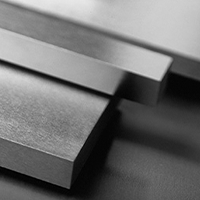Select Your Steel Grade
Choose between 44 different steel grades in our overview below:
You don't know which steel grade is right for you? No problem, we will help. Discover your steel in our Steel Guide
or contact us!
What is high speed steel?
High speed steel, also known as HSS, is a high alloyed tool steel for cutting tools like taps or milling heads but also tools like saws, lath tools or for cold forming. Tools cutting through steel and iron have to withstand high stresses and have to work, at the same time, precise and efficient.HSS features a high creep resistance with a possible working temperature of up to 1112°F. This working temperature makes this steel group unique and different compared to cold work steel with a working temperature of up to 392°F or hot work steel with a working temperature from 392°F to 752°F. Apart of the high creep resistance, HSS has good ductility and a high wear resistance and thermal hardness (red hardness).
Why is it called high speed steel?
The name high speed steel derives from the actual cutting speed this steel grade can achieve. HSS can reach a three to four times higher cutting speed compared to common tool steel and cutting speeds up to 10 times higher can be reached when comparing low alloyed steel to HSS. It is made possible to reach these cutting speeds through added alloys like chromium, molybdenum, tungsten, vanadium, or cobalt as the steel undergoes extreme thermal stresses. HSS can have a carbon content of up to 2.06.% and a mass fraction up to 30% of alloys.
What is the difference of HS, HSS, HSS-E and AHSS steel?
HS and HSS are describing the same steel HS (High Speed) Steel or HSS (High Speed Steel). HSS-E has added cobalt and is used for machining material with a high hardness and long cutting channels where high temperatures might be generated.
AHSS belongs to the group of unalloyed steel and name the modern, high strength, unalloyed cold work steels. AHSS stands for “Advanced High Strength Steel” and does not belong to the high speed steel group by definition.
What does HSS-PM stand for?
HSS-PM stands for powder metallurgical high speed steel and is being manufactured from powdered steel. All the needed components are melted in an induction oven and atomized by subjecting it to a strong gas jet. The resulting droplets will find their solid form in under a second and will form a very fine powder, they then get filtered and poured into a capsule. The capsule is vacuum-sealed and hot isostatically pressed (HIP). Due to the temperature of approx. 2102°F and high pressure, after time a solid and 100% dense steel block is formed.The resistance to fractur stresses of PM-steel is due to its fine and evenly distributed carbides, its high purity and optimized homogeneity, all these properties make this high speed steel a steel with high tensile strength/high creep resistance.
High speed steel: Advantages and disadvantages!
High speed steel has various advantages and disadvantages.Advantages of high speed steel:
- Hardness and wear resistance: High speed steel is known for its high hardness and wear resistance. As a result the steel holds its cutting edge and tool life when exposed to high temperatures and long machining times.
- High cutting speeds: Due to its high hardness, high speed steel manages high cutting speeds which result in better productivity and efficiency while machining.
- Good temperature resistance: High speed steel can withstand high temperatures without effecting hardness and tensile strength. With those properties it makes it ideal for applications where heat generation might be a problem, e.g., cutting metals.
- Precision machining: High speed steel makes it possible, due to it hardness and tensile strength, to machine precise and accurate.
Disadvantages of high speed steel:
- Decline of hardness at 1112°F: Hardness declines rapidly from a temperature of 1112°F. For this reason, high speed steel is not suitable for higher machining temperatures. When higher temperatures are needed, carbides or cutting ceramics should be considered.
Search for an alternative High Speed Steel with the ABRAMS STEEL GUIDE®!
All orange highlighted tiles show high speed steel with an array of properties.Just one click to your chosen steel grade with its properties.
It is possible to find an alternative or an equivalent steel grade in no time at all!
We have the solution! (Registration is not needed).
Try it now - find an alternative steel grade and its properties in no time.


